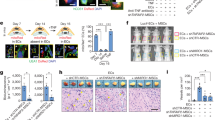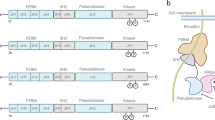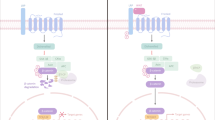Abstract
Liver kinase B1 (LKB1) is a serine/threonine protein kinase ubiquitously expressed in mammalian cells. It was first identified in Peutz-Jeghers syndrome as a tumor suppressor gene. Whether endothelial LKB1 regulates angiogenesis and tumor growth is unknown. In this study, we generated endothelial cell-specific LKB1-knockout (LKB1endo−/−) mice by crossbreeding vascular endothelial-cadherin-Cre mice with LKB1flox/flox mice. Vascular endothelial growth factor (VEGF) level was highly co-stained in endothelial cells but not in macrophages in LKB1endo−/− mice. Consistently, LKB1endo−/− mouse tissues including the lung, skin, kidney and liver showed increased vascular permeability. Tumors implanted in LKB1endo−/− mice but not macrophage-specific LKB1-knockout mice grew faster and showed enhanced vascular permeability and increased angiogenesis as compared with those implanted in wild-type mice. Injection of VEGF-neutralizing antibody but not the isotype-matched control antibody decreased endothelial-cell angiogenesis and tumor growth in vivo. Furthermore, LKB1 deletion enhanced mouse retinal and cell angiogenesis, and knockdown of VEGF by small-interfering RNA decreased endothelial cell proliferation and migration. Re-expression of LKB1 or knockdown of VEGF receptor 2 decreased the overproliferation and -migration observed in LKB1endo−/− cells. Mechanistically, LKB1 could bind to the VEGF transcription factor, specificity protein 1 (Sp1), which then inhibited the binding of Sp1 to the VEGF promoter to reduce VEGF expression. Endothelial LKB1 may regulate endothelial angiogenesis and tumor growth by modulating Sp1-mediated VEGF expression.
This is a preview of subscription content, access via your institution
Access options
Subscribe to this journal
Receive 50 print issues and online access
$259.00 per year
only $5.18 per issue
Buy this article
- Purchase on Springer Link
- Instant access to full article PDF
Prices may be subject to local taxes which are calculated during checkout







Similar content being viewed by others
References
Pasula S, Cai X, Dong Y, Messa M, McManus J, Chang B et al. Endothelial epsin deficiency decreases tumor growth by enhancing VEGF signaling. J Clin Invest 2012; 122: 4424–4438.
Carmeliet P, Jain RK . Molecular mechanisms and clinical applications of angiogenesis. Nature 2011; 473: 298–307.
Senger DR, Galli SJ, Dvorak AM, Perruzzi CA, Harvey VS, Dvorak HF . Tumor cells secrete a vascular permeability factor that promotes accumulation of ascites fluid. Science 1983; 219: 983–985.
Olsson AK, Dimberg A, Kreuger J, Claesson-Welsh L . VEGF receptor signalling - in control of vascular function. Nat Rev Mol Cell Biol 2006; 7: 359–371.
Carmeliet P, Ferreira V, Breier G, Pollefeyt S, Kieckens L, Gertsenstein M et al. Abnormal blood vessel development and lethality in embryos lacking a single VEGF allele. Nature 1996; 380: 435–439.
Levy NS, Chung S, Furneaux H, Levy AP . Hypoxic stabilization of vascular endothelial growth factor mrna by the RNA-binding protein HuR. J Biol Chem 1998; 273: 6417–6423.
Stein I, Itin A, Einat P, Skaliter R, Grossman Z, Keshet E . Translation of vascular endothelial growth factor mRNA by internal ribosome entry: implications for translation under hypoxia. Mol Cell Biol 1998; 18: 3112–3119.
Pagès G, Pouysségur J . Transcriptional regulation of the vascular endothelial growth factor gene–a concert of activating factors. Cardiovasc Res 2005; 65: 564–573.
Ryuto M, Ono M, Izumi H, Yoshida S, Weich HA, Kohno K et al. Induction of vascular endothelial growth factor by tumor necrosis factor alpha in human glioma cells. J Biol Chem 1996; 271: 28220–28228.
Giardiello FM, Trimbath JD . Peutz-Jeghers syndrome and management recommendations. Clin Gastroenterol Hepatol 2006; 4: 408–415.
Katajisto P, Vallenius T, Vaahtomeri K, Ekman N, Udd L, Tiainen M et al. The LKB1 tumor suppressor kinase in human disease. Biochim Biophys Acta 2007; 1775: 63–75.
Alessi DR, Sakamoto K, Bayascas JR . LKB1-dependent signaling pathways. Annu Rev Biochem 2006; 75: 137–163.
Shackelford DB, Shaw RJ . The LKB1-AMPK pathway: metabolism and growth control in tumour suppression. Nat Rev Cancer 2009; 9: 563–575.
Ollila S, Mäkelä TP . The tumor suppressor kinase LKB1: lessons from mouse models. J Mol Cell Biol 2011; 3: 330–340.
Xie Z, Dong Y, Zhang J, Scholz R, Neumann D, Zou MH . Identification of the serine 307 of LKB1 as a novel phosphorylation site essential for its nucleocytoplasmic transport and endothelial cell angiogenesis. Mol Cell Biol 2009; 29: 3582–3596.
Zhang W, Wang Q, Wu Y, Moriasi C, Liu Z, Dai X et al. Endothelial cell-specific LKB1 deletion causes endothelial dysfunction and hypertension in mice in vivo. Circulation 2014; 129: 1428–1439.
Ylikorkala A, Rossi DJ, Korsisaari N, Luukko K, Alitalo K, Henkemeyer M et al. Vascular abnormalities and deregulation of VEGF in LKB1-deficient mice. Science 2001; 293: 1323–1326.
Roberts WG, Palade GE . Increased microvascular permeability and endothelial fenestration induced by vascular endothelial growth factor. J Cell Sci 1995; 108: 2369–2379.
Jensen JS . Renal and systemic transvascular albumin leakage in severe atherosclerosis. Arterioscler Thromb Vasc Biol 1995; 15: 1324–1329.
Dvorak HN, Senger DR, Dvorak AM, Harvey VS, McDonagh J . Regulation of extravascular coagulation by microvascular permeability. Science 1985; 227: 1059–1061.
Greenberg Y, King M, Kiosses WB, Ewalt K, Yang X, Schimmel P et al. The novel fragment of tyrosyl tRNA synthetase, mini-TyrRS, is secreted to induce an angiogenic response in endothelial cells. FASEB J 2008; 22: 1597–1605.
Uemura A, Kusuhara S, Katsuta H, Nishikawa S . Angiogenesis in the mouse retina: a model system for experimental manipulation. Exp Cell Res 2006; 312: 676–683.
Denison FC, Hiscock NJ, Carling D, Woods A . Characterization of an alternative splice variant of LKB1. J Biol Chem 2009; 284: 67–76.
Towler MC, Fogarty S, Hawley SA, Pan DA, Martin DM, Morrice NA et al. A novel short splice variant of the tumour suppressor LKB1 is required for spermiogenesis. Biochem J 2008; 416: 1–14.
Mukhopadhyay D, Knebelmann B, Cohen HT, Ananth S, Sukhatme VP . The von Hippel–Lindau tumor suppressor gene product interacts with Sp1 to repress vascular endothelial growth factor promoter activity. Mol Cell Biol 1997; 17: 5629–5639.
Pal S, Datta K, Mukhopadhyay D . Central role of p53 on regulation of vascular permeability factor/vascular endothelial growth factor (VPF/VEGF) expression in mammary carcinoma. Cancer Res 2001; 61: 6952–6957.
Liang X, Li ZL, Jiang LL, Guo QQ, Liu MJ, Nan KJ . Suppression of lung cancer cell invasion by LKB1 is due to the downregulation of tissue factor and vascular endothelial growth factor, partly dependent on SP1. Int J Oncol 2014; 44: 1989–1997.
Zhuang ZG, Di GH, Shen ZZ, Ding J, Shao ZM . Enhanced expression of LKB1 in breast cancer cells attenuates angiogenesis, invasion, and metastatic potential. Mol Cancer Res 2006; 4: 843–849.
Shackelford DB, Vasquez DS, Corbeil J, Wu S, Leblanc M, Wu CL et al. mTOR and HIF-1alpha-mediated tumor metabolism in an LKB1 mouse model of Peutz-Jeghers syndrome. Proc Natl Acad Sci USA 2009; 106: 11137–11142.
Liu Z, Zhang W, Zhang M, Zhu H, Moriasi C, Zou MH . Liver kinase B1 suppresses lipopolysaccharide-induced nuclear factor κB (NF-κB) activation in macrophages. J Biol Chem. 2015; 290: 2312–2320.
Acknowledgements
We are grateful to Dr Lexi Ding who helped with the retinal angiogenesis experiments. This study was supported by grants from the National Natural Science Foundation of China (81570393 to WZ), the Natural Science Foundation of Shandong Province (ZR2015HM002 to WZ), the Taishan Scholar Project of Shandong Province of China (tsqn20161066 to WZ) and the National Institute of Health (CA213022, HL080499, HL089920, HL110488 and HL105157 to M-HZ).
Author information
Authors and Affiliations
Corresponding author
Ethics declarations
Competing interests
The authors declare no conflict of interest.
Additional information
Supplementary Information accompanies this paper on the Oncogene website
Rights and permissions
About this article
Cite this article
Zhang, W., Ding, Y., Zhang, C. et al. Deletion of endothelial cell-specific liver kinase B1 increases angiogenesis and tumor growth via vascular endothelial growth factor. Oncogene 36, 4277–4287 (2017). https://doi.org/10.1038/onc.2017.61
Received:
Revised:
Accepted:
Published:
Issue Date:
DOI: https://doi.org/10.1038/onc.2017.61
This article is cited by
-
Endothelial cell-specific expression of serine/threonine kinase 11 modulates dendritic cell differentiation
Nature Communications (2022)
-
Evaluation of LKB1 and Serine-Glycine Metabolism Pathway Genes (SHMT1 and GLDC) Expression in AML
Indian Journal of Hematology and Blood Transfusion (2021)
-
Endothelial cell rearrangements during vascular patterning require PI3-kinase-mediated inhibition of actomyosin contractility
Nature Communications (2018)



